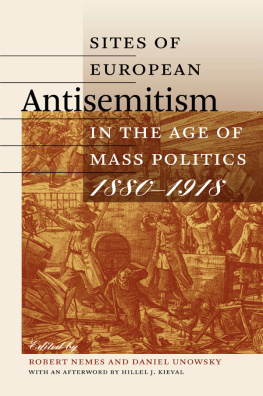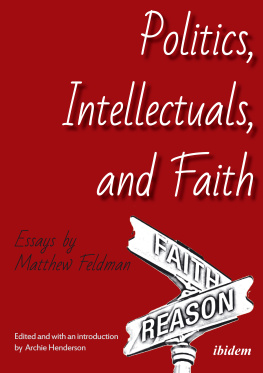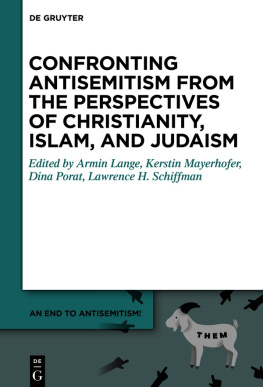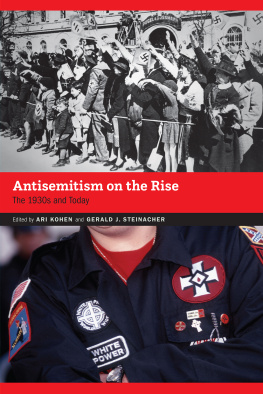THE TAUBER INSTITUTE SERIES
FOR THE STUDY OF EUROPEAN JEWRY
JEHUDA REINHARZ, General Editor
SYLVIA FUKS FRIED, Associate Editor
EUGENE R. SHEPPARD, Associate Editor
The Tauber Institute Series is dedicated to publishing compelling and innovative approaches to the study of modern European Jewish history, thought, culture, and society. The series features scholarly works related to the Enlightenment, modern Judaism and the struggle for emancipation, the rise of nationalism and the spread of antisemitism, the Holocaust and its aftermath, as well as the contemporary Jewish experience. The series is published under the auspices of the Tauber Institute for the Study of European Jewryestablished by a gift to Brandeis University from Dr. Laszlo N. Tauberand is supported, in part, by the Tauber Foundation and the Valya and Robert Shapiro Endowment.
For the complete list of books that are available in this series, please see www.upne.com.
Robert Nemes and Daniel Unowsky, editors
Sites of European Antisemitism in the Age of Mass Politics, 18801918
Sven-Erik Rose
Jewish Philosophical Politics in Germany, 17891848
ChaeRan Y. Freeze and Jay M. Harris, editors
Everyday Jewish Life in Imperial Russia: Select Documents, 17721914
David N. Myers and Alexander Kaye, editors
The Faith of Fallen Jews: Yosef Hayim Yerushalmi and the Writing of Jewish History
Federica K. Clementi
Holocaust Mothers and Daughters: Family, History, and Trauma
Ulrich Sieg
Germanys Prophet: Paul de Lagarde and the Origins of Modern Antisemitism
David G. Roskies and Naomi Diamant
Holocaust Literature: A History and Guide
Mordechai Altshuler
Religion and Jewish Identity in the Soviet Union, 19411964
Robert Liberles
Jews Welcome Coffee: Tradition and Innovation in Early Modern Germany
A Sarnat Library Book

BRANDEIS UNIVERSITY PRESS
An imprint of University Press of New England
www.upne.com
2014 Brandeis University
All rights reserved
For permission to reproduce any of the material in this book, contact Permissions, University Press of New England, One Court Street, Suite 250, Lebanon NH 03766; or visit www.upne.com
This publication was made possible through the generous support of Brandeis Universitys Bernard G. and Rhoda G. Sarnat Center for the Study of Anti-Jewishness, which aims to promote a deeper understanding of anti-Jewish prejudice, as well as Jewish and non-Jewish responses to this phenomenon, from both a historical and contemporary perspective.
Library of Congress Cataloguing-in-Publication Data Sites of European antisemitism in the age of mass politics, 18801918 / Robert Nemes and Daniel Unowsky, editors; afterword by Hillel J. Kieval.
pages cm.(Tauber institute series for the study of European Jewry) A Sarnat library book
ISBN 978-1-61168-581-7 (cloth: alk. paper)ISBN 978-1-61168-582-4 (pbk.: alk. paper)ISBN 978-1-61168-583-1 (ebook)
1. AntisemitismEuropeHistory19th century. 2. AntisemitismEuropeHistory20th century. 3. EuropePolitics and government18481871. 4. EuropePolitics and government18711918. 5. EuropeEthnic relations. I. Nemes, Robert, editor.
II. Unowsky, Daniel L., 1966, editor.
DS146.E85S58 2014
305.8924009409034dc23
2014003200
CONTENTS
ACKNOWLEDGMENTS
It is a great pleasure to thank the institutions that supported us in various ways and the people who offered advice and assistance during the long process of bringing this book to publication. We are fortunate to have enjoyed generous travel and research support from the departments of history at Colgate University and the University of Memphis. We are grateful that both universities continue to place great value on the advance of knowledge in the humanities and social sciences. The editors and contributors benefited from the opportunity to participate in and organize panels related to this volume at conferences hosted by the Association for the Study of Nationalities, the American Historical Association, and the Association for Jewish Studies. We also want to thank Werner Bergmann, Ulrich Wyrwa, Tim Buchen, and the Center for Research on Antisemitism at the Technical University of Berlin for inviting Daniel Unowsky to speak about his work and the project represented in this volume. Several contributors are affiliated with the Center or recently have completed doctorates there. Their scholarship is a testament to the success of this institution.
We were humbled by the contributors dedication, commitment, and willingness to work with us as we shaped the volume into a coherent whole. We thank Hillel Kieval for his close reading of all the chapters and for his generosity and patience. In addition to his inspired Afterword, he shared numerous insights from his own work with us. Many other colleagues offered suggestions for improvements after listening to conference papers or reading part or all of the manuscript. We are especially grateful to Marsha Rozenblit, Jonathan Sarna, Helmut Walser Smith, Harald Binder, Ted Weeks, and Rebekah Klein-Pejov. The authors would like to thank Noah Dauber for putting them on the track of Dreyfus in Kasrilevka.
It has been a wonderful experience to work with the editors and staff at Brandeis University Press, and we are thrilled to have this volume appear in the Tauber Institute Series for the Study of European Jewry. Our thanks go to Phyllis Deutsch, Susan Abel, and Elizabeth Forsaith for shepherding the manuscript through the review process and beyond.
We cannot let this opportunity pass without acknowledging the debt we owe to our teacher Istvn Dek. His magnificent scholarship, meticulous attention to detail, willingness to challenge conventional interpretations, and Menschlichkeit remain a model for us and so many others.
ROBERT NEMES & DANIEL UNOWSKY
INTRODUCTION
I doubt if the Dreyfus case made such a stir anywhere as it did in Kasrilevka. So begins Sholem Aleichems Dreyfus in Kasrilevka, a short story first published in a Yiddish journal in 1902. In the story, the residents of a remote Ukrainian shtetl become so obsessed with the Dreyfus affair, Sholem Aleichem tells us, that Dreyfus became a Kasrilevkite. When two people came together, he was the third. The people follow the events in France through a certain Zeidel, the shtetls lone newspaper subscriber. As the author wryly observes, the population learns through him rather than from him: they actively reinterpret and rework the news coming from France. At the end of the story, when Zeidels newspaper reveals the surprising and unwelcome verdict that Dreyfuss court-martial has been upheld in Paris, the residents of Kasrilevka simply refuse to believe him or his paper: Such a thing must not be! It must never be!
Pointed and powerful, Sholem Aleichems story captures the moral indignation of an East European Jewish writer in the face of antisemitism half a continent away. But Sholem Aleichem also documented antisemitic activity much closer to home, in Russia. He once wrote that Great winds can turn a tiny spark into a hellish conflagration, a lesson he brought home in stories about the anti-Jewish violence that punctuated the last decades of the Russian Empire.
Sholem Aleichems stories raise questions that are as pressing today as they were in his time. How do we explain outbreaks of violence and patterns of prejudice among groups who otherwise live in relative peace? How much do local contexts shape such episodes, and how important are external influences, including news, ideologies, and rumors that first took shape in other places and under different conditions? Put differently, is it common for Russian villagers to pay attention to what happens in France (and vice-versa)? How do residents of small towns and villages explain the breakdown of their social order? Finally, how do state and local authorities respond when minorities are persecuted?
Next page









